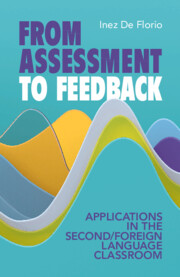Book contents
- From Assessment to Feedback
- From Assessment to Feedback
- Copyright page
- Contents
- TEFL Examples
- Introduction
- Part I Basic Concepts of Assessment and Feedback in the Foreign-Language Classroom
- Part II Assessment and Feedback in Its Different Manifestations
- 5 How to Implement Successful Feedback in Foreign-Language Teaching
- 6 Involving the Learners in Important Decisions
- 7 Feedback Is No One-Way Street
- 8 Peer Feedback Needs to Be Learned
- 9 Self-Assessment
- 10 Collegial Feedback Strengthens Language Teaching and Learning
- 11 What about Electronic Assessment and Feedback?
- 12 Remote and Hybrid Learning
- Part III Summative Assessment in Combination with Formative Feedback
- Glossary
- References
8 - Peer Feedback Needs to Be Learned
from Part II - Assessment and Feedback in Its Different Manifestations
Published online by Cambridge University Press: 19 January 2023
- From Assessment to Feedback
- From Assessment to Feedback
- Copyright page
- Contents
- TEFL Examples
- Introduction
- Part I Basic Concepts of Assessment and Feedback in the Foreign-Language Classroom
- Part II Assessment and Feedback in Its Different Manifestations
- 5 How to Implement Successful Feedback in Foreign-Language Teaching
- 6 Involving the Learners in Important Decisions
- 7 Feedback Is No One-Way Street
- 8 Peer Feedback Needs to Be Learned
- 9 Self-Assessment
- 10 Collegial Feedback Strengthens Language Teaching and Learning
- 11 What about Electronic Assessment and Feedback?
- 12 Remote and Hybrid Learning
- Part III Summative Assessment in Combination with Formative Feedback
- Glossary
- References
Summary
What is true for assessment and feedback between teachers and learners, has to be taken into account for peer feedback as well: The learners cannot sufficiently benefit from the various forms of peer feedback without appropriate preparation and guided practice. It is for the teacher – involving the learners as much as possible – to explain which feedback procedures are the most efficient and what has to be observed with regard to the timing and other important features when learners give feedback to their peers. In many cases, peer feedback is considered particularly beneficial and successful, but as with all instructional practices, it requires a differentiated view.As teachers are not directly involved when learners talk to each other in tandems or small groups, it is interesting to know what scientific research reveals about formative and even summative feedback between peers. Mark Gan, a doctoral student of Hattie, presents in his thesis a version of Hattie’s feedback model adapted to the use among peers. In the following, the Jigsaw puzzle is presented, which is useful in numerous other teaching and learning contexts, but lends itself to peer feedback, because it is clearly structured, Furthermore, it can create opportunities for reciprocal learner feedback.
Keywords
- Type
- Chapter
- Information
- From Assessment to FeedbackApplications in the Second/Foreign Language Classroom, pp. 124 - 136Publisher: Cambridge University PressPrint publication year: 2023

